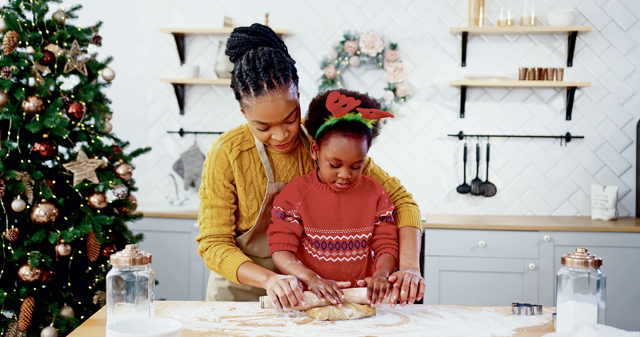
For gobble gobble and ho ho ho! The holiday season is upon us and you know what that means! Time to pack on the holiday pounds with baked goods galore!
Why not make the experience of baking your holiday goodies a developmentally beneficial one for your child? Aside from noshing on some delicious bites, here are some bonus benefits of baking.
Heavy work. Shopping at the grocery store is an ideal motor warm up for your child. Let them push the cart, pass you the flour sugar and other items from the lower shelves, help carry bags if appropriate, help unload the car, and help unload purchased ingredients and put them on the counter in preparation for baking. By using our big muscle groups, we enrich a child sense of readiness for learning as well as overall motor coordination.
Sensory input. Even your littlest child can participate in baking by experiencing the sensory aspects of this activity. For example, you can let a baby hit the bowl with a wooden spoon to make a drum, swirl some flour on their highchair tray or simply smell the different items such as the vanilla, sugar and butter.
Sequencing skills. School-age children can beef up their awareness of sequencing by baking. This means first understanding the steps and then executing the steps. You can simplify recipes by just using single words or drawing pictures in advance. Older children can print out the directions, read them aloud and cross them off when completed.
Math skills. I am not going to act like I am good at math, but I sure understand one needs a basic understanding for successful baking. You can challenge your older children by taking out all of the measuring cups, jars, spoons and asking them to problem solve how many of the quarter cups would you need for a whole cup of sugar, or how many teaspoons you would need for a tablespoon. Older children can even work on division — e.g. the bag of flour is 500 grams, what percentage do we need to get 300 grams.
Bilateral integration. 50 cent phrase alert! This simply means using both hands together in a coordinated manner. All children can improve upon this skill through the baking process. For example holding a box of sugar with one hand and pouring it into a measuring cup in the other hand. Little ones can take a glob of dough and roll it with a rolling pin. You can even have them roll the dough into a snake and practice cutting little pieces with scissors or a butter knife. Who cares if you use that glob of dough? It is just a fun way for them to participate in the activity.
Safety awareness. You can use kitchen time as an opportunity to teach or reinforce safety skills. For example, you can have a little child tell you what is a no no in the kitchen: Touching the stove, opening the refrigerator, touching knives, etc. Older children can learn about more sophisticated safety topics, such as how to safely use a toaster, how to avoid having appliances near water, the safest way to hold a knife, etc.
Social communication skills. Another very important bonus to engaging in a functional activity with your child is the way it naturally lends itself to open communication. When we are doing some thing with our hands, we are more able to share our emotions, express our thoughts and to communicate in a back-and-forth manner. Your teenager may open up about a new crush or your fourth grader may share some anxiety about performing the school play.
It doesn’t matter if you are baking bread, making a pie, or even busting out a roll of ready bake cookie dough. What matters is spending quality time with your child by doing a functional and festive activity together. Wishing you a happy kick off to the holiday season!
Author’s profile: Lisa Helenius is a practicing occupational therapist with over 25 years of pediatric experience. She currently is a partner at Growing Up Therapy. See https://growinguptherapy.com for more information.


